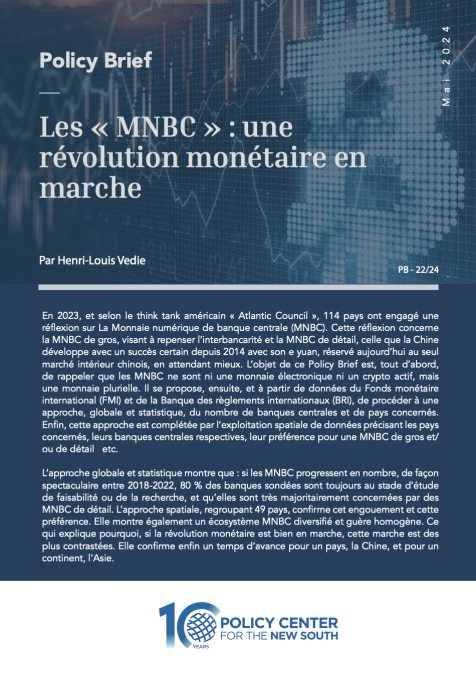RELATED CONTENT
-
AuthorsMay 15, 2024En 2023, et selon le think tank américain « Atlantic Council », 114 pays ont engagé une réflexion sur La Monnaie numérique de banque centrale (MNBC). Cette réflexion concerne la MNBC de gros, visant à repenser l’interbancarité et la MNBC de détail, celle que la Chine développe avec un succès certain depuis 2014 avec son e yuan, réservé aujourd’hui au seul marché intérieur chinois, en attendant mieux. L’objet de ce Policy Brief est, tout d’abord, de rappeler que les MNB ...
-
 AuthorsMay 14, 2024The Law of Self-Suffering Mahatma Gandhi, born 1869, assassinated 1948, demonstrated in his struggle for the independence of his native India (resisting British colonial arrogance), that passive resistance had a chance, despite being insulted by British statesman Winston Churchill as the “Hindu Mussolini”. Gandhi, a physically fragile man of just about 50 kilograms, dressed in white cloth (a white shawl and dhoti, allegedly woven by himself), and was, and forever is, the ‘bapu’ of ...
AuthorsMay 14, 2024The Law of Self-Suffering Mahatma Gandhi, born 1869, assassinated 1948, demonstrated in his struggle for the independence of his native India (resisting British colonial arrogance), that passive resistance had a chance, despite being insulted by British statesman Winston Churchill as the “Hindu Mussolini”. Gandhi, a physically fragile man of just about 50 kilograms, dressed in white cloth (a white shawl and dhoti, allegedly woven by himself), and was, and forever is, the ‘bapu’ of ... -
AuthorsMay 14, 2024As the African Continental Free Trade Area (AfCFTA) enters its fifth year, the rules of origin for trade in goods are still being finalised, but the institutional architecture is nearly complete with increased capacity, technical committees and new supporting instruments. Despite this progress in AfCFTA ‘policy supply’, meaningful trade under the AfCFTA is still to begin. For this to happen, there must be ‘policy demand’ from the private sector to use the agreement’s range of protoc ...
-
May 10, 2024This webinar will explore the unique challenges and strategies in earthquake management specific to Italy. It will offer insights into the country's effective response measures following significant seismic events and the evolution of building codes aimed at enhancing resilience. The sp...
-
Wiam Hammouchene, Kenneth Welman Chaula, Justice NyamangaraMay 10, 2024Fertilizers are essential for boosting agricultural productivity in Africa by replenishing soil nutrients and increasing crop yields. However, their optimal utilization faces challenges s ...
-
AuthorsAbdelkhalek TouhamiDorothee BoccanfusoMay 9, 2024L'idée d'un effritement de la classe moyenne marocaine est répandue, suggérant un glissement vers une classe aisée toujours plus riche et des classes plus pauvres ce qui sous-entend une augmentation de la polarisation dans la société. Cependant, aucune étude basée sur des données n'a été menée pour confirmer cette perception. Notre étude comble ce vide en analysant l'évolution de la classe moyenne entre 2012 et 2019. En utilisant la définition opérationnelle de Abdelkhalek (2014) de ...
-
May 9, 2024In this exclusive webinar, Megumi Muto, vice president of the Japanese International Cooperation Agency (Jica), delivers a presentation on how the agency is acting in disaster relief both in Japan, in Asia and worldwide ...
-
 AuthorsMay 9, 2024It all began in 1924, when the World Energy Council (WEC) was established in order to harness the collective expertise of the global energy community and translate vision into tangible outcomes. In April 2024, the city of Rotterdam hosted the 26th Congress of the World Energy Council, whose theme was “Redesigning Energy for Better Lives and a Healthy Planet”. It is not about a single energy transition, but rather many energy transitions. The concept of energy transition is not ...
AuthorsMay 9, 2024It all began in 1924, when the World Energy Council (WEC) was established in order to harness the collective expertise of the global energy community and translate vision into tangible outcomes. In April 2024, the city of Rotterdam hosted the 26th Congress of the World Energy Council, whose theme was “Redesigning Energy for Better Lives and a Healthy Planet”. It is not about a single energy transition, but rather many energy transitions. The concept of energy transition is not ... -
AuthorsMay 8, 2024Cet article examine l'évolution des relations entre les États-Unis d’Amérique et l'Afrique, en mettant en lumière la nature cyclique de l'engagement américain et ses implications pour les deux parties. Historiquement, l'Afrique n'a pas été une priorité constante dans la politique étrangère américaine, avec des périodes de collaboration intense alternant avec des moments de négligence relative. Depuis la fin de la guerre froide, l'engagement des États- Unis en Afrique e ...
-
 AuthorsMay 6, 2024The issue of environmental degradation represents a significant global challenge. It manifests in various forms, including physical alterations such as air pollution, ozone depletion, climate change, marine pollution and biodiversity loss. These changes are proven to be linked to human activities, such as energy production and consumption, tourism and agriculture. Additionally, factors like population growth and health and safety concerns contribute to environmental decline. Is Gro ...
AuthorsMay 6, 2024The issue of environmental degradation represents a significant global challenge. It manifests in various forms, including physical alterations such as air pollution, ozone depletion, climate change, marine pollution and biodiversity loss. These changes are proven to be linked to human activities, such as energy production and consumption, tourism and agriculture. Additionally, factors like population growth and health and safety concerns contribute to environmental decline. Is Gro ...








